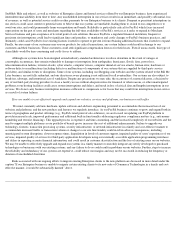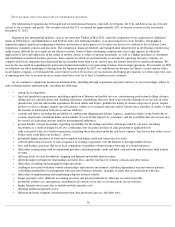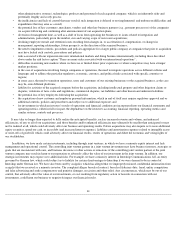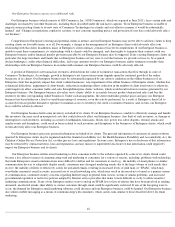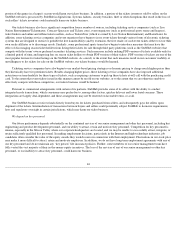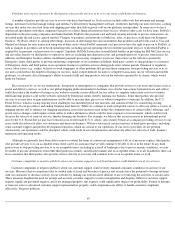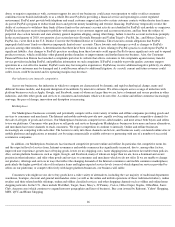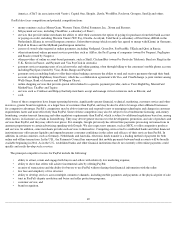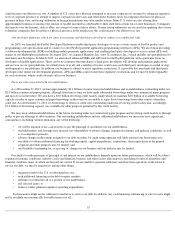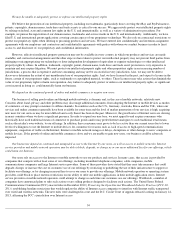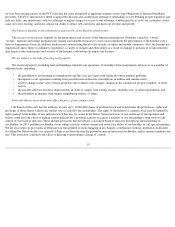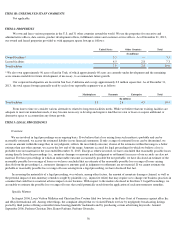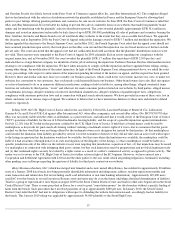eBay 2013 Annual Report Download - page 50
Download and view the complete annual report
Please find page 50 of the 2013 eBay annual report below. You can navigate through the pages in the report by either clicking on the pages listed below, or by using the keyword search tool below to find specific information within the annual report.
sources may be able to devote more resources to marketing and promotional campaigns, adopt more aggressive pricing policies and devote more
resources to website, mobile platforms and applications and systems development than we can. Some of our competitors may offer or continue
to offer free shipping, favorable return policies or other transaction-related services which improve the user experience on their sites and which
could be impractical or inefficient for our sellers to match. Our competitors may be able to innovate faster than we can, and new technologies
may further increase the competitive pressures by enabling our competitors to offer more efficient or lower-cost services. Our competitors may
be able to use the advantages of brick-and-mortar stores or other sorts of physical presence.
In addition, certain manufacturers may limit or cease distribution of their products through online channels such as eBay. Manufacturers
may attempt to use existing or future government regulation to prohibit or limit online commerce in certain categories of goods or services.
Manufacturers may also attempt to enforce minimum resale price maintenance or minimum advertised price arrangements to prevent distributors
from selling on our websites or on the Internet generally, or at prices that would make our website attractive relative to other alternatives. For
example, in June 2012, Adidas Group announced that it intends to restrict its dealers, on a global basis, from listing and selling Adidas and
Reebok products on sites including eBay.com, and Nike Inc. and ASICS Corp. have taken steps to similarly restrict Internet sales of their
products on platform sites such as eBay.com. The adoption by manufacturers of policies, or the adoption of new laws or regulations or
interpretations of existing laws or regulations by government authorities, in each case discouraging or restricting the sales of goods or services
over the Internet, could force our users to stop selling certain products on our websites. Increased competition or anti-Internet distribution
policies or regulations may result in reduced operating margins, loss of market share and diminished value of our brands. As we respond to
changes in the competitive environment, we may, from time to time, make pricing, service or marketing decisions or acquisitions that may be
controversial with and lead to dissatisfaction among some of our sellers, which could reduce activity on our websites and harm our profitability.
Although we receive Internet traffic from several large online services and search engine providers, these arrangements may not continue
on favorable terms or these companies may decide to promote competitive services. In any event, such arrangements may not result in increased
usage of our sites. In addition, companies that control user access to transactions through network access, Internet browsers, mobile networks,
mobile operating systems or search engines could promote our competitors, channel current or potential users to their vertically integrated
electronic commerce sites or their advertisers' sites, attempt to restrict access to our sites, or charge us substantial fees for inclusion. For
example, Google increasingly may steer its users to its own sites, adversely affecting traffic to our sites. Search engines increasingly are
becoming a starting point for online shopping, and as the costs of operating an online store continue to decline, online sellers may increasingly
sell goods through multiple channels, which could reduce the number and value of transactions these sellers conduct through our sites.
PayPal
The markets for PayPal's products and services are intensely competitive and are subject to rapid technological change, including but not
limited to: mobile payments, electronic funds transfer networks allowing Internet access, cross-border access to payment networks, creation of
new payment networks, and new technologies for enabling merchants, both online and offline, to process payments more simply. PayPal faces
competition and potential competition from existing online, mobile and offline payment methods, including, among others:
48
• providers of traditional payment methods, particularly credit and debit cards, checks, money orders and Automated Clearing House
transactions (these providers are primarily well-established banks);
• providers of “digital wallets” which offer customers the ability to pay online or on mobile devices through a variety of payment
methods, including Visa's V.me, MasterCard's MasterPass, American Express's Serve, Google Wallet and the Merchant Customer
Exchange (MCX) initiative supported by Walmart, Target and other major U.S. retailers;
• payment-card processors that offer their services to merchants, including Chase Paymentech, First Data, Bank of America Merchant
Services, Elavon, Vantiv, WorldPay, Barclays Merchant Services, Global Payments, Inc., Stripe and Balanced, and payment
gateways, including CyberSource and Authorize.net (both owned by Visa), SimplifyCommerce by MasterCard and First Data;
• Amazon Payments, which offers merchants the ability to accept credit card- and bank-funded payments from Amazon's base of
online and mobile customers on the merchant's own website. Amazon has recently launched a new payment service for online
merchants under the name Log in and Pay with Amazon;
• providers of mobile payments, including ISIS in the U.S., Buyster in France, Mpass in Germany, Weve in the U.K., Boku and
Crandy, many of which are owned by or supported by major mobile carriers; and
• providers of card readers for mobile devices and of other new Point of Sale and multi-channel technologies, including Square (which
has also begun to offer a marketplace service to sellers), Chase Paymentech, Bank of


